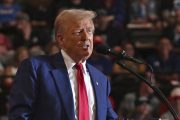
President Obama’s plan to raise the federal minimum wage from $7.25 to $10.10 an hour would result in the loss of half a million to a million jobs, according to a report of the non-partisan Congressional Budget Office released Tuesday. The proposed increase, which the president exhorted the Congress to pass in last month’s State of the Union address, would be a 40-percent hike over the current minimum over a three-year period, reaching the targeted figure of $10.10 in 2016.
The job loss projected by the CBO would mean between 0.3 and 0.6 percent of the workforce would be added to the unemployment rolls. The report acknowledges the uncertainty of its estimate of future job losses. “As with any such estimates, however, the actual losses could be smaller or larger; in CBO’s assessment, there is about a two-thirds chance that the effect would be in the range between a very slight reduction in employment and a reduction in employment of 1 million workers,” the report says.
Debate on the measure could begin in Congress as early as next month. Democrats generally support the measure, while yesterday’s report adds fuel to the opposition already expressed by Republican leaders.
{modulepos inner_text_ad}
“This report confirms what we’ve long known: While helping some, mandating higher wages has real costs, including fewer people working,” according to a statement issued by Brendan Buck, a spokesman for House Speaker John Boehner. “With unemployment Americans’ top concern, our focus should be creating, not destroying, jobs for those who need them most.”
A statement put out by Sen. John Thune of South Dakota, chairman of the Senate Republican Conference, echoed the concern that an increase in the minimum wage would increase joblessness in a time of unusually high-levels of long-term unemployment. “More than 3.5 million Americans have been unemployed for six months or longer, and the percentage of Americans in the labor force is at a low we haven’t seen since Jimmy Carter was president,” Thune said. “It’s time to give lower- and middle-income workers a break, not hammer them with more bad policies.”
Tuesday’s report was the second issued by the CBO this month that carried a negative assessment about a major Obama administration policy. Two weeks ago, the agency estimated the Affordable Care Act would result in job loss for 2.5 million workers by 2024, predicting small companies will reduce their number of full-time workers to avoid the health insurance requirements of the ObamaCare law, enacted in 2010. The law is leading both businesses and workers to choose government-sponsored benefits over employer-provided insurance, the report said.
“The non-partisan Congressional Budget Office confirmed yet again what we know to be true of government overreach in the marketplace: raising the minimum wage would slash jobs and harm an already fragile workforce,” Senate minority whip John Cornyn (R-Texas) said in a statement issued Tuesday. “Whether it’s Obamacare, a minimum-wage hike or a trillion-dollar stimulus bill charged to the nation’s credit card, the bottom line is the president’s big-government experiment kills jobs.”
The chairman of the president’s Council of Economic Advisers, on the other hand, disputed the CBO forecast. “CBO’s estimates of the impact of raising the minimum wage on employment does not reflect the current consensus view of economists,” Jason Furman said in blog post reported by the The Hill. “The bulk of academic studies have concluded that the effects on employment of minimum wage increases in the range now under consideration are likely to be small to nonexistent.”
A non-partisan federal agency established to provide independent analysis of economic and budgetary issues, the Congressional Budget Office was created in legislation signed by President Nixon in 1974. While offering projections of existing or proposed legislation, the office makes no policy recommendations. Among both economists and practicing politicians, however, debates over the minimum wage have been carried on for decades, with Democrats and liberal economists contending that higher minimums help both low-income workers and the economy in general, while conservative Republicans and free-market economists argue that government mandates for higher wages result in employers hiring fewer entry-level and low-skill workers.
“Minimum wages have their greatest unemployment impact on the least skilled worker,” George Mason University economist Walter Williams wrote in a recent column. “Who are these workers? For the most part, they are low-skilled teens or young adults, most of whom are poorly educated blacks and Latinos.”
A question seldom asked about legislative initiatives in Congress is whether a proposed act lies within the powers of Congress under the U.S. Constitution. The Constitution, of course, grants to Congress the power to “regulate Commerce with foreign Nations, and among the several States, and with the Indian Tribes” (Article I, Section 8). The object of what is commonly called the “Interstate Commerce Clause” was to enable Congress to eliminate the kind of barriers to the free flow of goods and services that various states had erected to protect local industries. The economic meaning of “commerce” when the Constitution was adopted was as it is still defined in our own time, according to Webster’s: “the exchange or buying and selling of commodities on a large scale, involving transportation from place to place.”
For the first 150 years after the Constitution was ratified, wages paid an employee at his workplace were not considered a part of interstate commerce and subject to federal regulation. In 1938, however, Congress passed a New Deal measure called the Fair Labor Standards Act, which established the first federal minimum wage. The Supreme Court, asserting the power of Congress to regulate not only commerce, but activities affecting interstate commerce as well, upheld the law as constitutional in its 1941 ruling in U.S. v. Darby Lumber Company.
A year later the court would rule in Wickard v. Filburn that to penalize a farmer for growing crops on more than his allotted number of acres, even though the produce was consumed by his own livestock on his own farm, is within the power of Congress to regulate interstate commerce. If Mr. Filburn had not grown the wheat for his livestock, the justices reasoned, he would have had to buy it elsewhere. Therefore his action affected interstate commerce and was subject to federal regulation.
Since virtually anything and everything has the potential to affect interstate commerce, the clause has been interpreted widely enough to give Congress nearly unlimited power.
Had that been the general understanding of the commerce clause at the time the Constitution was presented to the states, it is almost certain it would not have been ratified. “The powers delegated by the proposed Constitution to the federal government are few and defined,” wrote James Madison in Federalist, No. 45. “Those which are to remain in the State governments are numerous and indefinite.” That assurance was written explicitly into the Constitution itself a few years later with the passage of the Tenth Amendment: “The powers not delegated to the United States by the Constitution, nor prohibited by it to the States, are reserved to the States respectively, or to the people.”
With few exceptions, most Supreme Court rulings on the commerce clause over the past seven decades have stood that constitutional principle completely on its head.
Were it an Olympic event, justices sitting on the Supreme Court through those decades would have had, in addition to their lifetime jobs and ample salaries, the lion’s share of gold medals for mental gymnastics.



